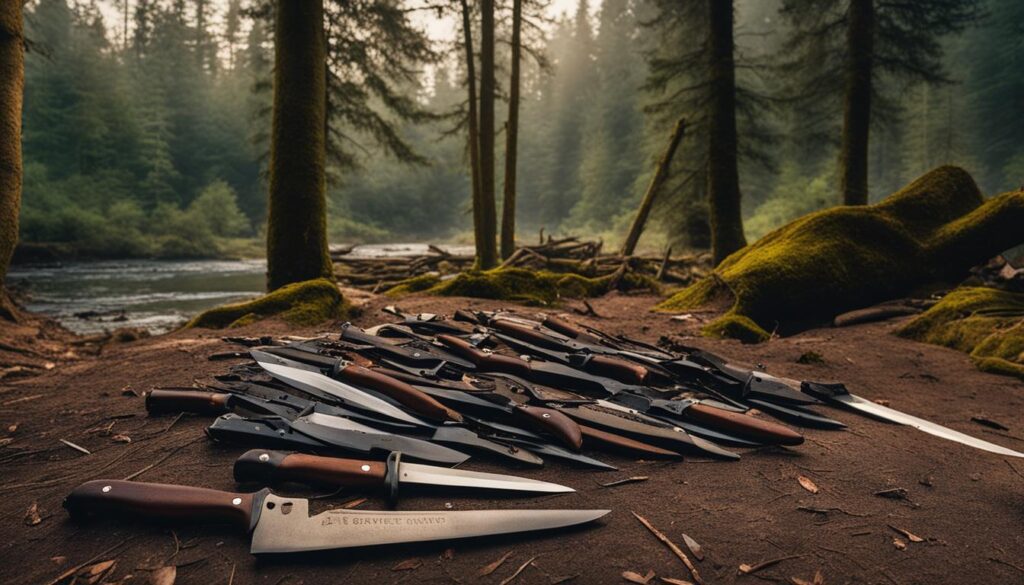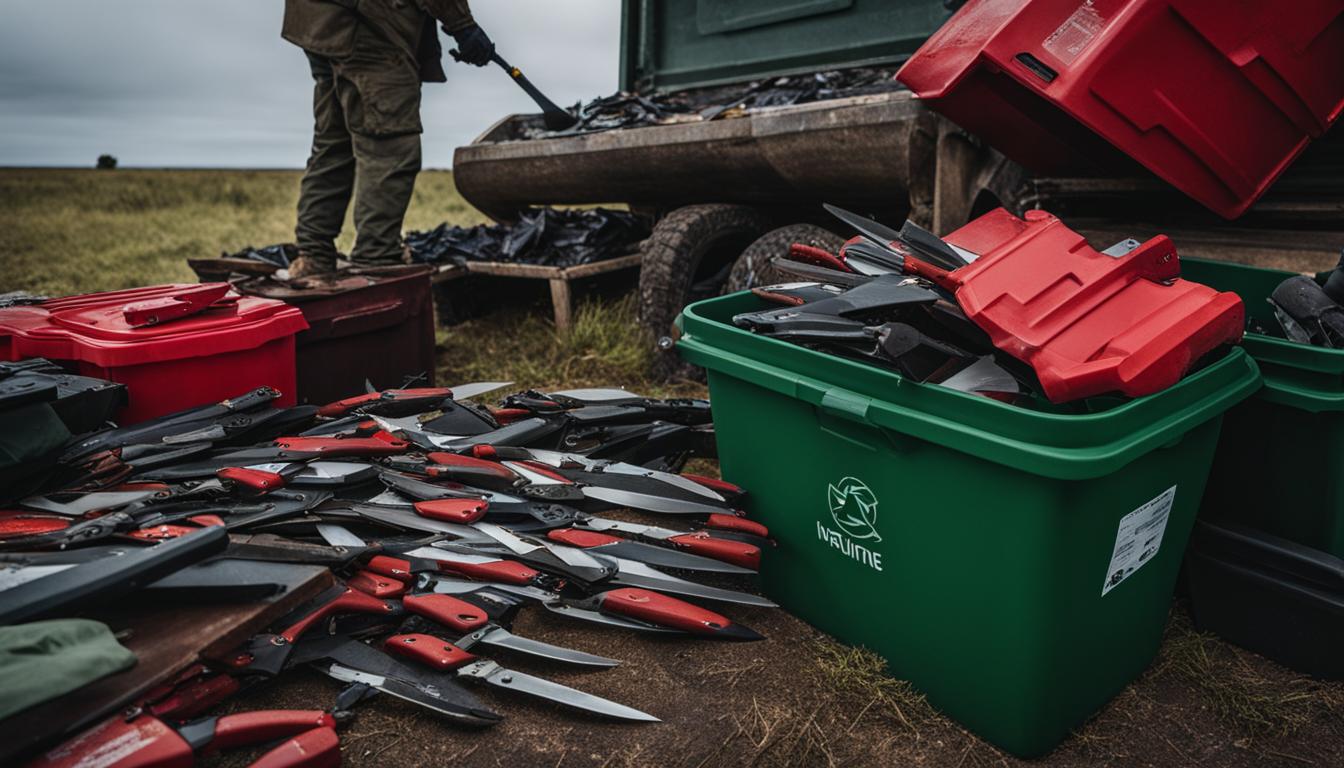Properly disposing of hunting knives is essential for safety and environmental reasons. Improper disposal can lead to accidents and harm to the ecosystem. This guide will provide you with all the necessary information on how to responsibly and safely dispose of your hunting knives.
Key Takeaways:
- Proper disposal of hunting knives is crucial for safety and environmental protection.
- Improper disposal can pose risks to individuals and contribute to pollution.
- Responsible disposal methods include recycling, donation, and secure bin disposal.
- Ensure the safety of others by following safe and secure disposal methods.
- Proper disposal of hunting knives is a legal obligation and moral responsibility.
Understanding the Risks of Improper Knife Disposal
Proper disposal of hunting knives is crucial for ensuring safety and protecting the environment. Failing to dispose of these knives correctly can pose various risks. Firstly, improperly discarded knives can easily be picked up by dangerous individuals or curious children, leading to potential injuries and accidents. It is our responsibility to prevent such incidents by following safe and secure disposal methods.
Moreover, improper disposal contributes to environmental pollution. When hunting knives are left to rust away or end up in landfills, they can leach harmful substances into the soil and water sources. This pollution can have detrimental effects on ecosystems and the health of both humans and wildlife. By understanding these risks, we can better appreciate the importance of proper disposal methods for hunting knives.
“Improper disposal of hunting knives can have serious consequences, both in terms of personal safety and environmental well-being. It is crucial that individuals take the necessary precautions to ensure these knives are disposed of in a responsible manner.”
By raising awareness about the risks associated with improper knife disposal, we can make informed choices when it comes to discarding hunting knives. Taking the extra steps to dispose of these knives safely not only prevents potential accidents but also helps protect our environment from unnecessary pollution. Let us now explore the responsible methods of disposing hunting knives to ensure a safer and cleaner future.
Table: Risks of Improper Knife Disposal
| Risks | Impact |
|---|---|
| Potential injuries | Accidents caused by dangerous individuals or curious children finding discarded knives. |
| Environmental pollution | Harmful substances leaching into the soil and water, impacting ecosystems and human health. |
Responsible Methods of Disposing Hunting Knives
Properly disposing of hunting knives is not only a matter of safety but also an important step in protecting the environment. There are several responsible methods available for disposing of hunting knives, ensuring that they do not end up in the wrong hands or contribute to environmental pollution.
One of the most sustainable options for knife disposal is recycling. Many local recycling companies accept metal items, including knives. By recycling hunting knives, the metal can be melted down and used to create new products, reducing waste and promoting a circular economy.
Alternatively, if your hunting knife is still in good condition, you can consider donating it to secondhand shops or art organizations. They may repurpose the knives for various purposes, such as creating unique pieces of art or selling them to individuals who can make use of them.
Table: Comparison of Hunting Knife Disposal Methods
| Disposal Method | Pros | Cons |
|---|---|---|
| Recycling | Promotes sustainability and reduces waste | May not be available in all areas |
| Donation | Provides an opportunity for repurposing or resale | Dependent on finding suitable organizations |
| Police Station Disposal | Ensures knives do not fall into the wrong hands | May not be available in all areas |
If none of these options are feasible, some police stations accept knives for proper disposal. This ensures that the knives are handled appropriately and do not pose a risk to others. Overall, responsible methods of hunting knife disposal not only contribute to a safer environment but also demonstrate our commitment to ethical and sustainable practices.
Safe and Secure Disposal Methods
When it comes to the disposal of hunting knives, prioritizing safety is of utmost importance. By following safe and secure disposal methods, we can prevent accidents and ensure responsible waste management. Here are some recommended techniques:
1. Tightly wrap the knife
To avoid any injuries during handling, it is essential to wrap the hunting knife tightly. Start by using several layers of newspaper or cardboard to cover the sharp edge of the knife. This wrapping not only protects you but also keeps the knife securely packaged throughout the disposal process.
2. Use protective materials
In addition to wrapping the knife, consider using additional protective materials such as bubble wrap or a sturdy container. These materials provide an extra layer of cushioning, reducing the risk of any accidents or injuries. Remember to securely seal the package to ensure the knife remains enclosed and protected.
3. Label the package
To alert waste management personnel about the contents of the package, it is advisable to label it appropriately. Use labels such as “sharp objects” or “kitchen knives” to indicate that the package contains potentially hazardous items. This ensures that the disposal process is carried out safely and efficiently.
By following these safe and secure disposal methods, we can contribute to a safer environment and promote responsible waste management. Prioritizing safety when disposing of hunting knives is not only essential for our own well-being but also for the protection of others and the environment.

| Safe Disposal Methods | Advantages |
|---|---|
| Tightly wrap the knife | – Prevents injuries during handling – Keeps the knife securely packaged |
| Use protective materials | – Provides additional cushioning – Reduces the risk of accidents or injuries |
| Label the package | – Alerts waste management personnel – Ensures safe and efficient disposal |
Conclusion
In conclusion, proper disposal of hunting knives is crucial for ensuring safety and protecting the environment. By following responsible methods of disposal, individuals can contribute to a cleaner and safer world.
There are various methods for disposing of hunting knives properly. Recycling is a sustainable option that allows knives to be melted down and repurposed. Donation to secondhand shops or art organizations gives knives a new life while helping others. Police stations also accept knives for disposal, ensuring they do not end up in the wrong hands.
When disposing of hunting knives, it is important to prioritize safety. Wrapping the knife tightly in layers of newspaper or cardboard prevents injuries and keeps the knife securely wrapped. Using bubble wrap or a sturdy container adds extra protection. Properly labeling the package as “sharp objects” or “kitchen knives” alerts waste management personnel about the contents.
By responsibly disposing of hunting knives, we not only fulfill our legal obligations but also take on the moral responsibility of protecting others and the environment. Let us all commit to proper and safe disposal methods for a safer and cleaner future.
FAQ
Why is it important to dispose of hunting knives properly?
Proper disposal of hunting knives is essential for safety and environmental reasons. Improper disposal can lead to accidents and harm to the ecosystem.
What are the risks of improper knife disposal?
Improper disposal of hunting knives can pose various risks. Discarded knives can be picked up by dangerous individuals or children, leading to potential injuries. Additionally, improper disposal contributes to environmental pollution, as knives can rust away or end up in landfills, leaching harmful substances into the soil and water.
How can I responsibly dispose of hunting knives?
There are several responsible methods to dispose of hunting knives. You can recycle them by taking them to local recycling companies that accept metal items. Alternatively, you can donate knives in good condition to secondhand shops or art organizations. Some police stations also accept knives for disposal. Reselling, creating art, or reforging are also viable options, depending on the condition and unique features of the knife.
How can I safely dispose of hunting knives?
When disposing of hunting knives, it is crucial to prioritize safety. One safe method is to wrap the knife tightly in several layers of newspaper or cardboard, focusing on covering the sharp edge. This prevents injuries during handling and ensures that the knife remains securely wrapped. Another option is using bubble wrap or a sturdy container for added protection. Labeling the package as “sharp objects” or “kitchen knives” also alerts waste management personnel about the contents.
Why is responsible knife disposal a legal and moral responsibility?
Properly and responsibly disposing of hunting knives is not only a legal obligation but also a moral responsibility. It helps protect the environment and prevents potential accidents or injuries that may occur if knives fall into the wrong hands.





